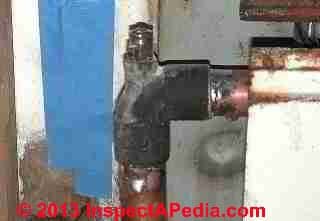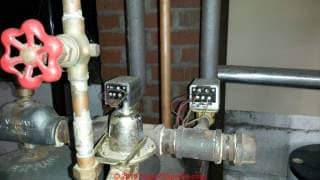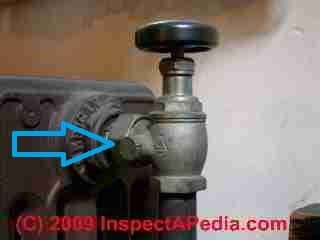 Radiator Air Bleeder FAQs-2
Radiator Air Bleeder FAQs-2
Q&A on Using Hot Water Rad / Baseboard Air Vents
- POST a QUESTION or COMMENT about troubleshooting problems bleeding the air out of hot water heating system radiators, baseboards, convectors etc.
Q&A on using or fixing air bleeder valves & automatic air purging valves on hot water heating systems, set #2.
This article series explains how to diagnose and repair problems with air bleed valves and we describe methods used to remove un-wanted, air from noisy or air-bound hot water heating system pipes, radiators, convectors, and baseboards. We illustrate how to buy and add air bleeders at baseboard elbows using a baseboard tee and air bleeder valves.
InspectAPedia tolerates no conflicts of interest. We have no relationship with advertisers, products, or services discussed at this website.
- Daniel Friedman, Publisher/Editor/Author - See WHO ARE WE?
Air Bleeder & Vent Troubleshooting FAQs-2
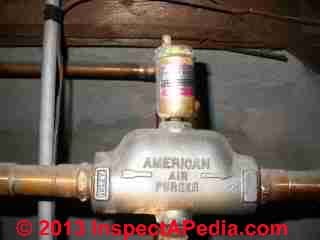 These questions & answers about heating system air bleeder valve installation, troubleshooting & repair were posted originally
These questions & answers about heating system air bleeder valve installation, troubleshooting & repair were posted originally
at AIR BLEEDER VALVES - be sure to see the repair advice given there.
On 2020-02-23 - by (mod) - are the air vents normally open or closed?
Anon
Thanks for asking a question about leaving hot water heating air bleeders open or closed.
The answer is, as Mark Cramer says, " ... it depends."
Above: A float type air bleeder vent installed atop the air scoop over a hydronic heating boiler. Normally the screw cap on float vents is left OPEN so that the vent can work to automatically remove air it collects.
[Click to enlarge any image]
If the air bleeder is a float type vent then the screw cap on the vent is kept loose about 1 1/2 turns so that the float vent can automagically vent air that it collects.
The only time we close off the screw cap on float vents is if the vent is leaking water. In that case, screw down the vent cap to stop the leak and then ask your heating service tech to replace the vent with a new one.
If the air bleeder is a manual air bleeder that opens and closes by a screw or square "skate key" type wrench then those vents are normally closed - else water would come out of the vent continuously.
Below: a screw type air bleeder valve on an elbow at a hot water heating baseboards. These manually-operated hot water heating system air vents are kept closed except when manually bleeding air from the system.
On 2020-02-23 by Anonymous
Should they be opened or closed when running normally
On 2020-02-22 - by (mod) - If hot water is not circulating through the heating zones
Milty
If hot water is not circulating through the heating zones for any reason (air bound, closed valve, scale clogging, bad zone valve, circulator not running) then what happens is on a call for heat the boiler turns on but as cold water isn't returning from zones to the boiler, it quickly reaches its HI LIMIT and shuts off.
Though you haven't found air bleeder valves it's still possible to bleed air trapped in heating lines by other methods. Live links to these two articles may help you out
AIRBOUND HEAT SYSTEM REPAIR by PUMP
AIRBOUND HEAT SYSTEM REPAIR by WATER FEED VALVE
On 2020-02-22 by Milty
I have heat on the first floor and heat on the second floor but the radiators are only hot in the master bedroom on the second floor - the in room bathroom radiator is cold as well as all the radiators in the upstairs bedrooms and hall bathroom.
I don't see any air bleed values anywhere upstairs. In the last few days I have to turn up the two electronic thermostats to 80 degrees to hear the furnace turn on. The pipes leaving the furnace are hot but the furnace runs for 2 to 3 minutes then stops - off for 5 minutes - then turns on for 2 to 3 minutes then off
- the radiator hot water pipes are hot on the first floor.
I keep the thermostat at 70 24/7 Mon-Fri. but last night the thermostat temp got down to 65 downstairs and upstairs until I bumped both up to 80 - then the furnace began to cycle off and on as noted above?
Any advice? Is some electronic device or sensor going bad?
On 2020-02-21 - by (mod) - Types of heating pipe insulation
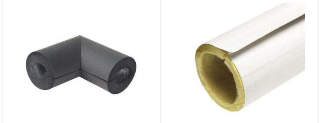 Ella
Ella
Types of heating pipe insulation
Modern steam pipe insulation is sold in several forms designed to clip around existing piping, then being banded or otherwise secured in place. Common materials include
- calcium silicate pipe insulation or Cal Sil usually sold to include a metal wrap-around cover
- fiberglass pipe insulation - both split tubing that snaps over existing pipes and in wrap-around form
- mineral fiber pipe insulation - same as above
- foam or rubber pipe insulation - as split tubing that slips over piping and snaps or uses an adhesive strip to seal in place
- ceramic fibre (more-likely for very high temperature applications)
Some common brands include
K-flex pipe insulation
Owens Corning pipe insulation
Johns-Manville pipe insullation
Wrap-On pipe insulation
Below are two pipe insulation examples available at building suppliers like Home Depot and Lowes stores.
No longer used is asbestos-based pipe insulation that you can see and identify by searching InspectApedia.com for that phrase.
On 2020-02-20 by ella
what type of pipe instulation for steam boilar
On 2020-02-05 - by (mod) - where is the air bleeder at my boiler?
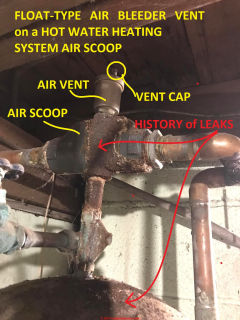 Paul that can with small "tire valve" cap atop in your photo is a the vent for a float type air bleeder at a strategic location on your boiler.
Paul that can with small "tire valve" cap atop in your photo is a the vent for a float type air bleeder at a strategic location on your boiler.
The cap should be loose (unless the valve is leaking water);
It looks to me [Click to enlarge any image] as if the float vent was replaced and that its predecessor leaked like mad for a long time.
OF course that bleeder as well as all of those you cannot open may need to be replaced.
When air is bled out of a hydronic heating system, IF makeup water is needed then the most common input is through an automatic water feeder/pressure reducing valve; on some boilers one may need to add water manually - when the boiler is cold, set pressure to the usual starting point of 12 psi for a residential boiler.
On 2020-02-05 by Paul D.
I have a baseboard boiler system in my house. Air needs to be bled out, but none of the old bleeder valves will turn. All registers are still producing heat, but the air-lock bangs have turned into what sounds like water rushing through the lines when it calls for heat and the circulator kicks on.
I’ve noticed that that an automatic bleeder has been added to the sending pipe just before the first radiator (see pic). My pressure is good (15), and temp as well (190).
If what’s in the pic is in fact an auto bleeder, which I’m assuming they added because of the faulty manual ones, can I safely release air from it without the system calling for water? I ask this because it seems like something has to replace the air, and I don’t want to add any cold water to a hot boiler.
So, can I safely remove air from the system via the auto bleeder without worrying that cold water is going to replace the air?
On 2019-11-25 by (mod) - hot water system makes a banging noise
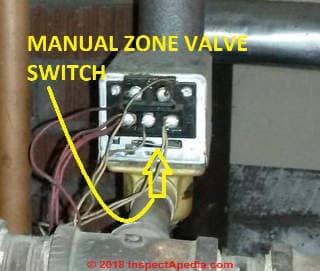 Sean
Sean
Try the search box just near the top or bottom of any of our pages (or in the on page drop down menu on mobile devices) to find our article diagnostic steps found at BANGING HEATING PIPES - that will be more complete than if I wing it here.
On 2019-11-24 by Sean
My hot water system makes a banging noise all the time even if I bleed them. I bleed them regularly and never get air always water. I would love to silence them cause they wake me regularly.. what can I do to fix this hammering noise?
On 2019-11-23 by Anonymous
I have a bleeder valve on boiler. A plumber took the nut off says I don’t need it
On 2019-10-25 by (mod) -
Watch the boiler temperature; is it turning off because it's reaching the cutoff temperature (set on the primary control aquastat) ? If so then yeah maybe a circulator pump isn't pumping or the system is air bound as you suggest.
But the problem can certainly be elsewhere.
You don't give the fuel (oil or gas) but often the problem with a boiler whose burner is short-cycling on and off is
- loose or shorted thermostat or control wiring
- a bad primary control or flame sensor
- a poorly-adjusted burner
- a combustion air deficiency
- a chimney that's blocked
Oil burners: see the diagnostic steps at OIL BURNER WONT RUN https://inspectapedia.com/heat/Oil_Burner_Wont_Run.php
Gas burners: see the diagnostic steps at GAS BURNER FLAME & NOISE DEFECTS https://inspectapedia.com/plumbing/Gas_Flame_Noise_Defects.php
Each of those articles suggests other diagnostic routines near the end of the article.
On 2019-10-25 by Norm
we have a slant fin boiler.the boiler keeps kicking on and off. we have replaced the control panel. had the pumps checked. we don't know what else to do. do you have any suggestions? thanks Norm
On 2019-09-14 by (mod) -
If your air bleeder valve is one that looks like the valve at the very top of this page then I suspect that the valve stem or core is leaking and needs to be replaced. Or you can just replace the entire valve assembly.
But a trip to try first is to remove the cap and with a rag and hand to catch water just to press the pain in the center of the valve a time or two to see if flushing the valve seat stops the leak. If the valve continues to leak or lakes more you can temporarily stop the leak by screwing the cap tightly onto the valve. However in that case of out needs to be replaced
On 2019-09-13 by Anonymous
why does my bleeder valve on my boiler drip
On 2019-05-04 by (mod) -
Take a look in the ARTICLE INDEX for the diagnosis and repair of Airbound heating systems
On 2019-05-03 by Jerlam
I can’t seem to get the house above 65degrees. The boiler will start and run normally, but then I hear what sounds like steam being released and the boiler stops. I have a 3 zone baseboard hot water system. One circulator pump and zone valves.
On 2019-03-11 by (mod) -
Sounds like there may be air in your heating system piping. Solutions are given throughout this article series such as installing air bleeder valves where needed or your service tech may use a pump and may manually Force water through the piping to remove air.
On 2019-03-09 by Gerald
I have an Electric Hydronic heating system in a 2 story home, 2 zones on each level, (system is in the basement heating the other 2 levels)
2 questions I need help with ....
1 - The first floor has no vents of any kind on the rads is this a concern ? My rads on this floor dont seem to get as hot as the 2nd floor witch has air vents that I can bleed on every 2nd rad.
2- When a zone calls for or shuts off heat you can hear a loud rush of waster type noise is that normal? (10 psi on system)
Thanks
On 2018-11-13 by (mod) - how to open a zone valve by hand - manual lever
 Maybe, Justin.
Maybe, Justin.
There is a manual zone valve switch that can be used to latch your zone valves into the OPEN position - pointed to by the yellow arrow in my clip from your photo.
Slide the lever to the right until it latches under the protrusion from the top of the horizontal lever slot.
However one mode of zone valve failure is the jamming of the mechanical valve itself. If this has happened you will find that you can't move the lever to latch into the open positoin.
[Click to enlarge any image]
Reader note: some zone valve models can be moved to the "open" position by turning a wheel in the bottom of the valve. Other models may not have a manual wheel or lever to open the valve.
On 2018-11-13 by Justin - half my house is freezing cold
I have dual zone water heater. One zone isn't working when thermostat calls for heat but other is fine.
Can I out the switch to manual open? And if I do should I shut of thermostat for that zone? This way when other zone calls for heat it can cycle hot water to both zones.
Half my house is freezing and need to find parts and get fixed. Sending a pic of my two zone switches or gates I think
On 2018-11-11 by (mod) - where to start bleeding air from a cold hot water heating system
Great question, Mary.
The most-efficient way to figure out where to start bleeding air from an air-bound heating system in which some radiators or baseboards won't get hot is as follows:
Starting at the heating boiler, follow the hot water supply pipes leaving the boiler enroute to radiators or baseboards.
Feel along the pipes (don't get burned) moving ever further away from the boiler.
At the first point where you feel pipes are cold that's where there's probably trapped air.
This presumes that
- You turned up all thermostats
- The boiler ran and got hot
- The circulators are running
- The zone valves are open
I haven't seen an authoritative answer to "where to start the air bleed process", but if you cannot follow all of the heating pipes, I'd either
- Start at the lowest cold radiator or baseboard in the building and use its air bleeder valves
- Start at the lowest air bleeder first, figuring that that helps avoid pushing more air upper in the building during the procedure .
Air is most-likely to be at the highest points in the system but don't let theory fool you.
Air can become trapped in longer horizontal piping runs or in lower-floor radiators just as easily as on upper floors.
You will probably find that air does not come out of every manual bleeder.
Watch out: you will have trouble bleeding air from a hot water heating system if you don't first turn up the thermostats to get the boiler and system up to full operating temperature and pressure.
See AIR BLEEDER VALVES for details.
On 2017-11-29 16:15:06.711629 by Anonymous
Where does the air get in , in a hot water system
On 2017-11-19 03:41:06.275958 by (mod) -
Lucy,
We don't know from your message whether the problem is an Airbound heating system or circulator pump that's not running or thermostat that's not causing the circulator to run or a zone valve that is not opening. Those would be things to ask your heating service technician. In other words we need to understand how your heating system works, and what controls heat flow to the cold floor before we can decide which components to check, replace, or repair.
On 2017-11-19 03:39:29.780740 by (mod) -
Charlie,
It's possible to add event along the Run of a heating baseboard but not as easy as you might think. You would need to have a plumber remove some of the thin material cut the baseboard and solder in a copper tea that had a tapping in the tub into which you can screw an air bleeder. That location however will not be as effective as having an air bleed valve at the high end of the baseboard run.
On 2017-11-18 22:01:03.472102 by Charlie
I have a hot water system and my 1 baseboard were you would bleed it is covered by a permanent cabinet is there a way to add a vent were it's not blocked ???
On 2017-11-18 20:58:56.989958 by lucy
I have a Bradford white combination hot water and heating tank. I have heat on the first floor .... heat on the last floor but no heat in the middle floor at all. I have all baseboards and none of them have bleeder valves. I had someone bleed the water tank itself for trapped air but to no avail as far as fixing the problem. Please help!
On 2017-11-18 19:11:43.327263 by Dom
Why do pressure relief valve discharge
On 2017-11-08 16:40:42.156908 by Reginald
I'm not getting water from my radiators I have a Dunkirk steam boiler. What could be the problem?
On 2017-07-31 22:08:42.056096 by (mod) -
Fred,
It's a perfectly fair question: but one that involves a bit of arm-waving to answer. Normally it's trivial to un-screw a small-tapped or threaded plumbing part. The arm-waving is that if there have been leaks or the connection is quite old it may be rusty as heck.
In that case I would NOT try this repair during the heating season when we might be left having to leave the heat off because we tried to remove the bleeder, broke it off and now have a radiator with a hole in it.
First: it may be possible to replace just the bleeder core. See our AIR BLEEDER VALVE REPAIR article at https://inspectapedia.com/heat/Air_Bleed_Valve_Repair.php
Else you'll have to remove and replace the bleeder. First buy a new one of the same sized tapping.
Then ...
Off season, heat off, system cooled down, no pressure, try squirting a bit of Liquid Wrench on the threads, then try un-screwing the valve using a suitably-sized wrench that turns the valve from its base.
To install a new valve you may need to clean up threads and use teflon tape or paste.
Use the page top or bottom CONTACT link if you want to send me photos of the situation and perhaps we can comment further.
On 2017-07-31 16:49:29.341307 by Fred
How hard is it to remove an air bleeder valve (1/8 inch) on a hot water system installed in 1980. The house is 96 years old and was heated by oil with the change coming in 1979 but the first heating season in 1980. It's a manual valve which used a skate key to bleed but the stem seems t have broken off.
There is no leakage of water just concerned about being able to remove the old valve and not cracking the valve with the threaded portion left inside the radiator. The radiator is made of solid cast iron.
On 2017-07-31 by (mod) - how difficult is it to remove & replace a rusted old air bleeder valve on a cast iron radiator
Fred,
It's a perfectly fair question: but one that involves a bit of arm-waving to answer. Normally it's trivial to un-screw a small-tapped or threaded plumbing part. The arm-waving is that if there have been leaks or the connection is quite old it may be rusty as heck.
In that case I would NOT try this repair during the heating season when we might be left having to leave the heat off because we tried to remove the bleeder, broke it off and now have a radiator with a hole in it.
First: it may be possible to replace just the bleeder core. See our AIR BLEEDER VALVE REPAIR article.
Else you'll have to remove and replace the bleeder. First buy a new one of the same sized tapping.
Then ...
Off season, heat off, system cooled down, no pressure, try squirting a bit of Liquid Wrench on the threads, then try un-screwing the valve using a suitably-sized wrench that turns the valve from its base.
To install a new valve you may need to clean up threads and use teflon tape or paste.
Use the page top or bottom CONTACT link if you want to send me photos of the situation and perhaps we can comment further.
On 2017-07-31 by Fred
How hard is it to remove an air bleeder valve (1/8 inch) on a hot water system installed in 1980. The house is 96 years old and was heated by oil with the change coming in 1979 but the first heating season in 1980. It's a manual valve which used a skate key to bleed but the stem seems t have broken off. There is no leakage of water just concerned about being able to remove the old valve and not cracking the valve with the threaded portion left inside the radiator. The radiator is made of solid cast iron.
On 2017-03-15 15:31:53.959804 by (mod)
Allen
If there's no air released at an air bleeder valve , and if water comes out of the valve when you open it, then either the system is not air-bound ,or it's air-bound in a section or piping not serviced by the bleeder valve.
If the heating pipes don't get hot I'd start by seeing if the boiler is running in response to a call for heat (or at least check temperatures at the boiler) and I'd see if the circulator is working or zone valve is opening.
On 2017-03-15 03:29:55.862909 by Allen
I guess I was wrong. After checking back to the pipes on either side of the valve, although now just room temperature, the piping remains the same temp. I tried the lever 2 more times, waited, but no more gurgling or air sounds. What do I do now?
On 2017-03-15 03:20:29.270243 by Allen
The bleeder valve is a finned unit in the center of two water valves about 12" apart. A flat stamped metal lever moves from the normally up position to a fully down position.
An opening in the front of the baseboard unit allows an easy release and upward push up of the lever. I've moved the lever twice and heard air release and then water gurgling. The piping on either side of the bleeder valve is now warm. Have I successfully bled the system?
On 2017-02-07 14:19:58.553111 by Maurice
I've encountered a corroded bleeder valve on a base board heating system. I want to replace the bleeder valve. Is this a relatively simple DIY project for someone mechanically inclined?
Can you give simple step by step instructions?
On 2017-02-05 20:21:34.245755 by Pamela Miller
I think I have air bound in the system but when I look at the valve,instead of a slot,it's rounded like a cap. Is there a way to bleed these valves?
On 2017-02-03 12:41:46.634724 by Joe
Hot water heating system. Does not heat properly. Radiators get warm but not as hot as they should get.
Have had a number of boiler people in. They say the boiler and thermostat are fine . I have to bleed air from the first radiator regularly.
So I am now pretty sure that air is being trapped on this one zone (I have 4 zones) between the boiler and the first radiator in line (it is a long line to the first radiator).
When I look at the line coming out of the furnace I do not see any air release valve above the boiler.
Two questions.
1. Should there be an air release valve on the zone line coming out of the boiler in the basement?
2. Instead of a manual release valve on the first radiator should I have someone install an automatic one?
On 2017-01-08 21:50:08.535829 by (mod)
Bobby,
I can't guess from your question if the problem is an airbound heating system or a problem right at the boiler, or a bad circulator pump, or something else.
But certainly repeatedly bleeding water doesn't fix anything. If no AIR can be bled from your baseboards or radiators, then you can stop the bleeding procedure.
The system could still be air-bound if air is blocking a pipe that doesn't happen to slope or rise such that its air moves to the point where you're doing the bleeding.
BUt before fooling more with air bleeding I'd call for help from your heating service company. Or to read more yourself search InspectApedia for COLD RADIATOR DIAGNOSIS & REPAIR to see other causes of these problems.
Keep me posted.
On 2017-01-08 01:15:41.057044 by bobby
if any one can help me email is bobbyaycock30@yahoo.com need help getting the heat to warm up the house baseboard heaters just barly get warm and stop after letting water and air out pls help
On 2017-01-08 01:07:44.569267 by booby
what should i do i bleed my baseboard heaters let air and water out multiple times and only a lil heat comes out of them then they stop i really need help dont know nothing about boiler heaters and its cold in south dakota pls help
On 2016-12-19 16:45:21.974788 by (mod)
Roger
Hearing gurgling water means you didn't get all of the air out of the system. If you install an automatic float type vent at the high point of each baseboard run that might work for you. (Check periodically for water leaks).
On 2016-12-19 16:44:25.792556 by (mod)
Sarif:
Look at the start and end of each hot water pipign run as well as at the start or end of baseboards or radiators; for older cast iron radiators look at the end-top of the radiators
On 2016-12-19 15:36:10.475542 by roger
have cast iron baseboards. 2 story home. I bleed off the air on the upper floor radiaters during the winter but at night it sounds like water is running when the heat is on. Any help with this?
On 2016-12-18 19:43:00.455299 by Sharif
Where can I find the air vent in my floor heating system in my flat? I think it is not working properly, the heating is distributed unevenly through the floor and I suspect that because of the air in the system.
On 2016-12-11 03:25:05.653623 by (mod)
Karen,
You might want to search inspectapedia.com for
NO HEAT, DIAGNOSIS
There are a number of possible explanations for the problem that you described. I would start by saying that they heater is running in response to the call for heat at the thermostat if it's not it would make sense to call your heating service person for repair.
On 2016-12-10 23:57:22.401328 by Karen Kelly
Baseboard registers are warm (barely) to the touch. Thermostat set at 82° but only reads 71°. Daughter bleed the individual registers, but they are still barely warm. Just bought this house in June and have no idea what to do next.
On 2016-11-30 15:11:10.999665 by Ken Gorman
Hi there I am experiencing problems with heating hot water mainly no good flow through the coil, I have tried all the normal venting etc and all valves are operating. The main problem is if i turn pump speed up from 1, to 2 or 3 to try and get full flow, the expansion pipe in the F & E starts sucking air in ?
Want do you think I should try next Ken
On 2016-11-29 19:05:18.857339 by Will
Well, I left it a few days and still no air in either zone. One other thing I did was manually operate the fill valve while the system was running, the pressure is up to 30-35 psi now. Not enough to trip the relief valve and it seems to be working.
Either that....or I finally got all the air out.
On 2016-11-23 03:09:23.091718 by (mod)
AUTHOR:Will (no email)
COMMENT:No bleeder valves on my radiators but the 2nd floor bleeder valve was closed, that was the zone that had a lot of air in it last night, after I bled the first floor. (I forgot to check the second)
When I opened the second floor valve and pushed the pin I got water.
When I turned the heat on I got heat and no gurgling.......so where did all that air go ?
Has the bleeder valve worked whilst I was upstairs waiting for the heat to work it's way upstairs ?
I guess I'll leave it a couple of weeks to see what happens. Thanks for your help and suggestions !
On 2016-11-23 02:34:35.398611 by (mod)
If I assumed you meant bleeder valves, not blender,
Then I'm guessing but if one opens the air bleeder valve on an upper floor when the heating system is not up to full operating pressure indeed air may enter rather than exit.
You need to be sure that the heating system is up to full operating pressure before trying to bleed air.
On 2016-11-23 01:31:54.774427 by tim
My second floor zone 1 has two blender valves.one where the pipe comes up, and one where it goes down. When I open either, it sucks air into the system. The pipes are loud and gurgling. Any ideas?
On 2016-11-22 23:10:17.954120 by (mod)
Louise:
AS SOON AS YOU SEE WATER coming out of the air bleeder valve, close it - you're finished there. DO NOT bleed any extra volume of water out of the system; that won't help anything and it just requires more makeup water at the boiler.
On 2016-11-22 23:09:26.276210 by (mod)
Anon:
Very good question. Something's wrong for sure. Either you're not getting all of the air out of the system, or there is an air leak into it.
I'm doubtful about air leaks into hot water heating systems as the system is usually under pressure, but it's possible that during cool-down an opening, such as at as bad circulator mounting pump flange might leak air in as well as other times leaking water out. Look for signs of water leaks around the boiler.
An over-charged bladderless expansion tank might also inject extra air into the heating system. BUt that would find its way out through float type bleeder valves or manual air bleeding.
Most likely: you've got a larger air reserve elsewhere in your heating system - such as at a long horizontal nearly dead-level piping run, and it's taking some time for the circulator to push air through the system to the point where you're trying to bleed it out.
Try the AIR BLEEDER DIAGNOSIS article recommended at CONTINUED READING at the end of this article or at AIR BLEEDER VALVES
On 2016-11-22 19:48:17.396120 by Louise
How much water do I let out before I close the valve?
On 2016-11-22 10:08:34.397359 by Anonymous
As I bleed the system it keeps on refills with air?
On 2016-11-22 00:25:54.594974 by Will
No bleeder valves on my radiators but the 2nd floor bleeder valve was closed, that was the zone that had a lot of air in it last night, after I bled the first floor. (I forgot to check the second)
When I opened the second floor valve and pushed the pin I got water. When I turned the heat on I got heat and no gurgling.......so where did all that air go ? Has the bleeder valve worked whilst I was upstairs waiting for the heat to work it's way upstairs ?
I guess I'll leave it a couple of weeks to see what happens.
Thanks for your help and suggestions !
On 2016-11-21 23:02:58.354730 by (mod)
Will:
Air in a float valve pushes an internal float that in turn opens the valve from the inside.
Your radiators may also have air bleeder valves.
On 2016-11-21 21:57:08.664374 by Will
Thanks for the info
1) OK, the caps are loose
2) I didn't know there was a pin in the valve, I'll check that tonight. However, if I have to push the pin to let the air out how is it let out automatically ?
3) I'm probably going to do this anyway
4) I don't think I can have both since each radiator is fed through the floor (hardwood) and the returns go back under the floor and on to the next radiator.
There are no sections of pipe visible worth mentioning. I will think about adding bleeders in the return side above the furnace though.
My guess is that the bleeders I have are stuck and that the air isn't being vented - where is the air coming from, city water presumably. I have no visible leaks that allow air in (and water out) although in reality it could probably quite easily be leaking unnoticed.
I'll swap the valves and see what happens.
Thanks !
On 2016-11-21 21:14:41.691727 by (mod)
Will
I'm not sure what's going on at your system, but
1. the screw cap on float type air bleeder valves is normally left loose all the time so that the valve can automagically vent air when it grabs some.
2. If you remove the screw cap and press down the schrader valve pin in the air valve and water squirts out, then there's no air at that point to be vented
3. If the air valves are really stuck and not venting air - say from build-up of corrosion, yes certainly I'd replace them.
4. GOod last question. Yeah there are actually air purgers at several high points in a system.
Air can get trapped such that it is grabbed at *local* high points such as right over the boiler.
For example air might be pushed or pulled through a zone pipe into the boiler on the return side, then it bubbles up the boiler output riser and hopefully is vented there.
So you want both: air vents at the boiler on the outlet side and on some systems on the return side too - as well as at other high points in the piping system.
On 2016-11-21 14:42:13.139837 by Will
I keep getting air in my system and have to purge it every couple of weeks. I opened my automatic bleeders and nothing comes out, should I screw the caps down tight after purging the air using the shutoff valve and drain spigot method ?
Since nothing comes out of the bleeders should I replace them ?
Also, my furnace is in my basement, the bleeders are on elbows maybe 3-4 feet above the furnace but probably 2 feet below the run of radiators so obviously not the "highest point". Does this matter ?
Thanks
On 2016-11-13 18:34:59.664903 by Michael
Thank you! this article is very helpful. We love our hydronic heat and I want to make sure I keep it running well, this was just what I needed, thanks.
On 2016-10-19 18:23:43.244484 by (mod)
Harry, the little key tool you described is widely sold in several sizes of which 1/8" square is standard; it's described as a Radiator Air Vent Key or Radiator Air Bleeder Key, for less than $1.00 each. You'll find these at your local hardware store if your are lucky enough to have one that's not been squashed by the big box stores.
On 2016-10-19 17:31:51.579072 by Harry Rust
I want to bleed the air "if there is any trapped" in all the old heavy radiators in my house. I don't know the proper name of the tool used to do this but I think it looks similar to a key. Anyway, I need to know where to get one. Thank you.
On 2016-10-13 16:37:17.245268 by James M
i have a unique outdoor wood boiler system with one forced air coil and a side arm heat exchanger. I am a plumber by trade but amd having trouble with this particular scenario.
The wood boiler im using has an atmospheric port at the boiler outside, which is about 10-15 feet below the highest point in my heating system. with great difficulty i am able to get all pumps primed but once running the air is still present in the pipes. and after a day or so i get air lock from air bubbles pooling in high spots.
I cannot use auto air vents because of the open port at the boiler as soon as i open a valve to bleed air it sucks more air into the system due to the negative pressure that the system is running on... im about to get a airscoop but will it work under this negative pressure scenario? thanks for any feedback. (p.s. winter is upon us)
On 2016-10-10 13:36:59.345177 by (mod)
Only air should come out of an automatic air bleeder valve; If the valve begins leaking water on its own, that is when you're not fooling with it, it needs to be replaced.
If water comes out of an air vent that has been manually opened then it should be closed, and we can infer that there is no air present in that part of the heating system piping.
On 2016-10-09 20:49:06.304076 by Anonymous
Only Air comes out but no water or very slight?
On 2016-01-29 22:12:52.686047 by ryan
I opened the value on my forced hot water baseboard and air came out then a minute of water and air came out. It went on for more then a minute is this normal? And does the water automatically refill?
On 2016-01-29 22:09:40.307808 by Anonymous
air came out with water for more then 1 minute?
On 2015-11-23 13:35:13.613216 by (mod)
Bob search InspectApedia.com for AIR BOUND HEATING SYSTEM = the zone that is not heating may be air bound; or if you have separate circulators, zone valves, or thermostats, one of those controls for the cold zone may need repair.
On 2015-11-22 by Bob
One of the pipes that circulates water in the heating system is not hot. Others are hot and heat is fine for those rooms.
On 2015-10-20 by Anonymous
Automatic bleed valves are normally left open.
On 2015-10-20 by Bill
I have a bleeder valve on the top of a pipe between the joists in the ceiling of the basement (above the oil fired furnace/hot water heater). It is cracked open, like a permanent vent/bleed. Is this correct? Seems to me that they should remain closed.
...
Continue reading at AIR BLEEDER VALVE FUNCTIONS or select a topic from the closely-related articles below, or see the complete ARTICLE INDEX.
Or see these articles on
Airbound Heating System Repair
- AIR-BOUND HEATING SYSTEMS - home
Suggested citation for this web page
AIR BLEEDER VALVE DIAGNOSTIC FAQs-2 at InspectApedia.com - online encyclopedia of building & environmental inspection, testing, diagnosis, repair, & problem prevention advice.
Or see this
INDEX to RELATED ARTICLES: ARTICLE INDEX to HEATING BOILERS
Or use the SEARCH BOX found below to Ask a Question or Search InspectApedia
Ask a Question or Search InspectApedia
Try the search box just below, or if you prefer, post a question or comment in the Comments box below and we will respond promptly.
Search the InspectApedia website
Note: appearance of your Comment below may be delayed: if your comment contains an image, photograph, web link, or text that looks to the software as if it might be a web link, your posting will appear after it has been approved by a moderator. Apologies for the delay.
Only one image can be added per comment but you can post as many comments, and therefore images, as you like.
You will not receive a notification when a response to your question has been posted.
Please bookmark this page to make it easy for you to check back for our response.
IF above you see "Comment Form is loading comments..." then COMMENT BOX - countable.ca / bawkbox.com IS NOT WORKING.
In any case you are welcome to send an email directly to us at InspectApedia.com at editor@inspectApedia.com
We'll reply to you directly. Please help us help you by noting, in your email, the URL of the InspectApedia page where you wanted to comment.
Citations & References
In addition to any citations in the article above, a full list is available on request.
- In addition to citations & references found in this article, see the research citations given at the end of the related articles found at our suggested
CONTINUE READING or RECOMMENDED ARTICLES.
- Carson, Dunlop & Associates Ltd., 120 Carlton Street Suite 407, Toronto ON M5A 4K2. Tel: (416) 964-9415 1-800-268-7070 Email: info@carsondunlop.com. Alan Carson is a past president of ASHI, the American Society of Home Inspectors.
Thanks to Alan Carson and Bob Dunlop, for permission for InspectAPedia to use text excerpts from The HOME REFERENCE BOOK - the Encyclopedia of Homes and to use illustrations from The ILLUSTRATED HOME .
Carson Dunlop Associates provides extensive home inspection education and report writing material. In gratitude we provide links to tsome Carson Dunlop Associates products and services.


